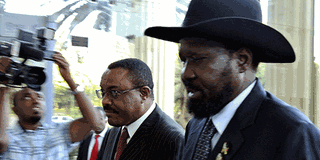Cross-border rows sap the Sudans’ energies as internal conflicts persist

Photo | AFP
Ethiopian Prime Minister Hailemariam Desalegn (2nd L) arrives with the President of South Sudan, Salva Kiir (R) in Addis Ababa on January 4, 2013. Kiir is in the Ethiopian capital on Hailemariam’s invitation to meet with his Sudanese counterpart, Omar al Bashir.
What you need to know:
- States spending huge amounts of cash waging war but have their own serious problems to resolve
Barely into 2013, the red lights were last week again flashing in Sudan, even as tension mounted between the region’s two belligerent neighbours just days ahead of the latest peace summit on Friday.
Early last week, South Sudan was already sounding the alarm bells as it accused its neighbour to the north of mounting fresh ground and air attacks against it ahead of last Friday’s summit.
According to reports, South Sudan army spokesman Col. Philip Aguer accused the northern neighbour of having “[an] attitude of war without provocation” and of not honouring past peace agreements.
Casualty figures
Aguer reportedly did not give any casualty figures, but still claimed that Sudan warplanes had attacked South Sudan territory in Western Bhar-el-Ghazal State, while its ground forces had allegedly attacked southern army bases on Wednesday.
The summit in Addis Ababa on Friday was between President Salva Kiir and his Sudanese counterpart Omar al-Bashir.
The hostilities ebbed only after a flurry of activities involving organisations such as the African Union and the United Nations Peace and Security Council. Glimmers of hope for a new era of peace and stability in the region were unfortunately short-lived, as an atmosphere of mutual suspicion persisted.
To compound matters, the cost of last year’s war, however short-lived, was that South Sudan in particular suffered heavy casualties. In the meantime, there were threats of the imposition of sanctions by the United Nations when the two nations appeared reluctant to pursue the path of peace.
Last Friday’s summit aside, recent sabre-rattling by the Sudans seemed to signal the possibility of a new fully-fledged war. But ironically, the two neighbours, while spending huge amounts on waging war, have serious problems of their own to resolve.
The South, for instance, is faced with a serious rise in food and water prices, as well as the lack of proper medical care and infrastructure. In addition, the relatively new nation has to contend with significant refugee flows and a generally poorly functioning economy.
Combined, these problems make life for the South Sudan citizens a daily struggle, sometimes leading to wanton violence.
As if the rampant cross-border skirmishes are not bad enough, and despite the fragile peace process, both Sudans also have significant internal conflicts to deal with.
After decades of violence during the North-South civil war – which was followed by a fragile peace agreement – palpable legacies of violence remain, fuelling numerous localised conflicts.
For instance the South, on independence already one of the poorest countries in the world, has had to deal with the herculean effort of building a state almost from scratch, while also facing multiple rebel groups in the border states of Unity, Jonglei, and Upper Nile.
The South has repeatedly accused the North of supporting the rebels, and in March 2011 produced documents claiming to prove that President Bashir was heading a plot to overthrow the SPLM government in the South, accusations the North denies.
As for the North, its greatest crisis is probably the Darfur one, which has captured world attention over the past few years and whose resolution seems to be a long way coming. In the meantime, it has embarked on a policy of expelling southerners from its territory, creating more problems for its southern neighbour.




